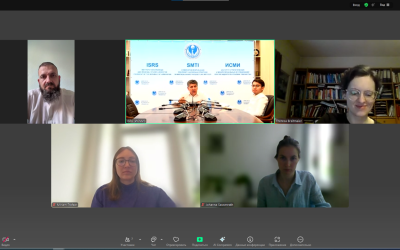ISRS Director took part in the 13th World Peace Forum in Beijing

From July 2 to 4 this year, the 13th World Peace Forum was held in Beijing under the slogan “Advancing Global Peace and Prosperity: Shared Responsibility, Benefit and Achievement.”
The event was organized by Tsinghua University and the People's Institute of Foreign Affairs of China. The forum is attended by more than 1,200 representatives from 86 countries and regions, including former government officials, heads of international organizations, and leaders and experts from leading think tanks.
The discussions focused on issues of strengthening regional stability and expanding partnership in Eurasia in the context of the transformation of the world order.
Among the guests of honor were Vice President of the People's Republic of China Han Zheng, former Prime Minister of Belgium and former President of the European Council Herman Van Rompuy, former Prime Minister of Japan Yukio Hatoyama, and others.

In his speech, he emphasized that over the past 20 years, the SCO has become an important element of the international system, uniting 26 countries of Asia, Europe and Africa, including members of the UN Security Council, G20, BRICS and ASEAN. The Organization's countries account for over 40% of the world's population (3.5 billion people), about 1/4 of the world's GDP and more than 15% of world trade. The combined GDP of the 10 member states reached $25 trillion in 2024.
Particular mention was made of the association’s strong institutional basis, which includes more than 80 international treaties, 35 statutory bodies and 40 working mechanisms.
As a convincing example of the effectiveness of the association, E. Aripov cited the activities of the Regional Anti-Terrorist Structure (RATS), which in three years has identified and neutralized more than 200 terrorist cells and confiscated about 7.6 thousand units of weapons. Moreover, thanks to the measures taken to stimulate trade, the trade turnover of member countries has increased 100 times over the past 20 years.
The strength of the SCO and its uniqueness lies in its ability to unite states that are completely different in cultural, civilizational, economic and geopolitical terms. The special attractiveness of the SCO, as E. Aripov emphasized, is provided by its non-aligned status, the principle of openness and non-direction against third countries.
At the same time, despite the impressive results, the SCO, according to the director of the ISRS, must adapt to the new geopolitical reality. The previous world order, based on international institutions and nuclear deterrence, is losing its stability. The bipolar model is a thing of the past, unipolarity is being replaced by multipolarity, and global regulatory mechanisms are experiencing a crisis of confidence.
Speaking about increasing the effectiveness of the SCO in the area of security, the head of the ISRS drew attention to a number of specific measures.
First, the need to strengthen institutions for cooperation in the field of security. The Director of ISRS supported the initiative to form a Universal Center based on RATS in Tashkent with the expansion of its mandate to include issues of countering cyber threats, suppressing the financing of terrorism.
As the expert pointed out, the active use of digital platforms by terrorists for propaganda, financing, training, and planning cyberattacks is of particular concern. He also recalled the long-discussed initiatives to create a Center for Combating International Organized Crime in Bishkek and an Anti-Drug Center in Dushanbe. These structures, according to him, should receive not only a formal status, but also real powers, resources, and mechanisms for operational interaction.
E. Aripov also stressed the importance of adopting at the summit in China the Program for Countering Extremist Ideology for 2026–2030, initiated by the President of Uzbekistan at the Delhi Summit.
Second, the development of coordinated approaches of the SCO towards Afghanistan, since the situation in this country directly affects the stability and security of the region. “We should not repeat previous mistakes – isolation will only worsen the socio-economic situation and create conditions for the activation of destructive forces,” the director said. In this context, he proposed resuming the work of the SCO-Afghanistan Contact Group to coordinate efforts and develop a common strategy.
In conclusion, Eldor Aripov noted that in the current conditions it is important not to allow the weakening of unity and to preserve the Shanghai spirit and non-aligned status of the SCO. "The organization has all the necessary potential to become the leading force in the formation of a new regional security architecture," he said.
The World Peace Forum (WPF) is a leading international platform on global security issues, founded in 2012. The main goal of the WPF is to discuss current issues of international and regional security, develop constructive approaches to solving global challenges, strengthen mutual understanding and develop international cooperation.

Next

On July 4, 2025, an online meeting was held between the First Deputy Director of the Institute for Strategic and Regional Studies under the President of the Republic of Uzbekistan (ISRS) Akramjon Nematov and the head of the Afghanistan, Central and South Asia Unit of the German Berghof Foundation Basir Feda.
05.07.2025





